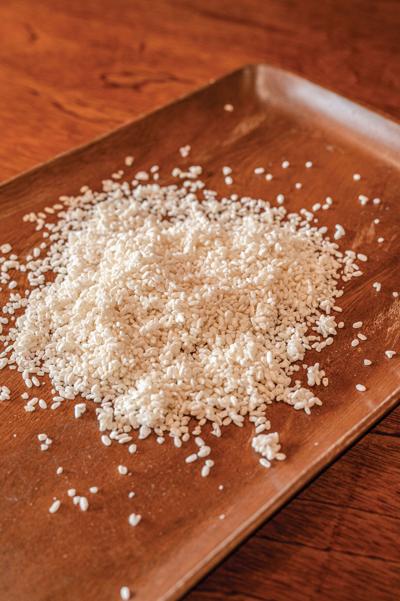
Koji from Proper Saké Co.
There’s a sterile room in the back of Rice Vice with its own monoculture. Temperature probes and fan boxes control heat and moisture, making sure owner Byron Stithem’s 160 kilograms of living rice doesn’t kill itself. Koji, the rice-and-fungus symbiosis that’s become extremely on-trend in Nashville’s culinary world, grows here.
“I’ve been getting it from Byron for four years — his is the cleanest I’ve ever used,” Chris DeJesus tells the Scene while prepping for dinner service at Butcher & Bee. DeJesus, Butcher & Bee’s executive chef, keeps koji in a plastic container in the back corner of the restaurant’s walk-in fridge, drawing from his stash when inspiration strikes. Right now, he’s using it to make fermented peppers and okra miso. “It pulls moisture, concentrates sugars, breaks down proteins and enzymes, all that. It’s insane.”
Clean koji is an essential step in brewing consistent sake, a traditional Japanese alcoholic rice beverage Stithem started brewing in Nashville six years ago as Proper Saké Co. (Stithem has since relocated from the Gulch to East Nashville, where Proper’s Rice Vice also serves as a sake bar and home for pop-up food events.) When chefs like DeJesus took notice, Stithem started making culinary koji on the side. Culinary koji follows the exact same process Stithem uses for his sake but with a slightly different grain.
“Koji is the finished product with fully propagated spores,” explains Stithem in his koji room. He makes his koji with Aspergillus oryzae, the technical name for the common sake mycelium that brewers usually call “koji kin.” “If you put it under a microscope, it’d have the same mycelial structure as a mushroom.” The fungus comes from Japan as a fine green powder, which Stithem sifts over big bags of rice like fine powdered sugar or Parmesan cheese.
It then moves to kitchens. Chefs’ fermentation craze was helped along by The Noma Guide to Fermentation, a buzzy cookbook published in 2018 from the industry-leading restaurant known for its innovative kitchen. Renewed attention on Japanese culinary culture has made superstars out of miso and koji, the cuisine’s foundational fermented ingredients, influencing kitchens at acclaimed Nashville spots including Bastion, Dozen, Butcher & Bee, Rolf and Daughters, Folk, Hathorne and Henrietta Red.
“The dish called for a vegan sauce that would fall into a buttermilk ranch category,” says Eric Nolden, who works at Henrietta Red. “We added koji, water, salt and thyme — it took a few weeks to ferment. It gives you this really savory sauce, like ranch dressing, but without dairy. Just fermented rice inoculated with this mold.”
Koji has also helped Henrietta Red ferment scraps of bread and peeled vegetables into special sauces and misos. Nolden buys two kilos from Stithem every week or so.
“If you’re a chef who pays attention to national trends, it’s obvious that everyone’s using it,” says Nolden. “It’s an indispensable tool we need to have in the toolbelt.”








